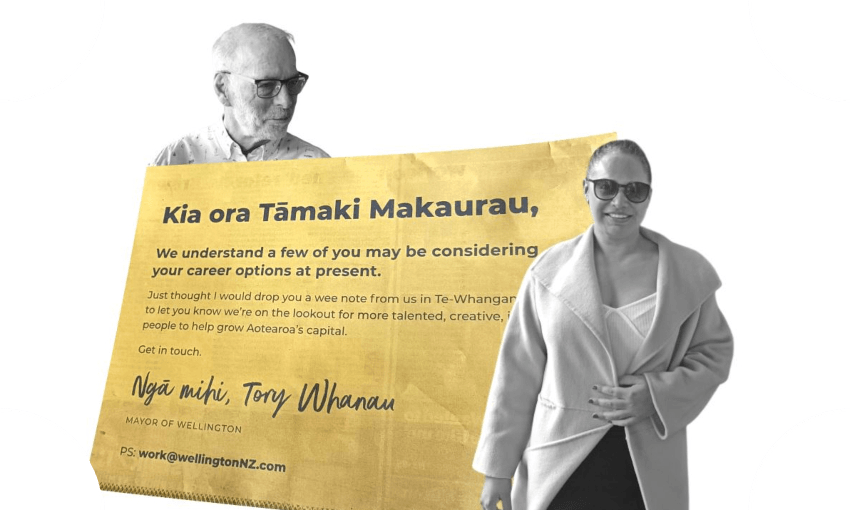Call it trolling, call it moment-seizing recruitment: the mayor-elect of Wellington has a message for Aucklanders, including the people Wayne Brown wants to boot off Auckland city boards. What, we ask Tory Whanau, is the real target?
Several dozen recently elected local body leaders are gathered today in Wellington for “mayor school”. Wayne Brown, incoming mayor of Auckland, is not among them. If he had time between meetings this morning to flick through his city’s newspaper, however, he might have alighted on a page-two ad, directly opposite reports on both his instruction to Watercare to halt any work on Three Waters reforms and his upcoming meeting with Jacinda Ardern.
It was another Wayne Brown news story to which the Herald advertisement alluded, however: the mayor-elect’s many demands for the resignation of chairs and boards at council-controlled organisations (CCOs), and his promise of a clear-out among council staff. The chair of Auckland Transport, Adrienne Young-Cooper, stood down within hours of the result 10 days ago, but Brown has vocally encouraged more to follow her lead out the door.
“Kia ora Tāmaki Makaurau,” began the half-page ad, atop a wash of yellow. “We understand a few of you may be considering your career options at present.”
It continued: “Just thought I would drop you a wee note from us in Te-Whanganui-a-Tara to let you know we’re on the lookout for more talented, creative, innovative people to help grow Aotearoa’s capital. Get in touch. Ngā mihi, Tory Whanau.”
Wayne Brown declined to be interviewed on Whanau’s message (or on anything, for that matter). A spokesperson did, however, offer the following statement: “The mayor doesn’t do Wellington but any migration from Auckland to Wellington will lift the average IQ of both cities.”
Here’s what Whanau has to say.
The Spinoff: Are you picking a fight with Auckland?
Tory Whanau: No! The main reason for the advert is that our council has a programme we’ll be running over the next term to attract talent to Wellington, whether it’s from Auckland or overseas, as well as retaining talent. We have some sectors, including hospitality, governance roles, IT, gaming, that are screaming out for new employees. So this advert is just part of a wider programme.
There is a timeliness to it. We’ve seen the mayor threatening to fire some people already. What I’m saying is, nau mai, haere mai, come to Wellington instead.
So you are inviting resigning members of CCO boards to come and work in Wellington?
Yes, I am. Yes, I am. Send me your details.
Would you also welcome to Wellington any of the following: Efeso Collins, Craig Lord, Viv Beck, Leo Molloy?
I would welcome all of them with open arms. In particular, I would welcome Efeso.
Have you heard from Wayne Brown yet?
No, not yet.
Because when he sees that ad he might get cross and demand that you resign.
He might do. I expect that he would.
What’s so great about Wellington? What’s so great about living there?
We get a lot of flak, a lot of people calling our city lame. But I’ve seen, over the last few months on the campaign trail, that it’s far from that. We’ve got some challenges to deal with, in regard to housing affordability and public transport, but we’re well on the way to setting ourselves up to be a real future-focused city. I’ve seen some of the projects currently on the books. I’m really excited. But now that we’re past that massive Covid wave, there are a lot of people back in this city now.
I live just one block up from Courtenay Place. Its bars and restaurants are constantly full. Especially with Wow in our city over the past couple of weeks, you couldn’t even get accommodation, you could not get a restaurant reservation, and I think that’s a real sign of things to come for our city. I’m going to make it better.
Apart from the cost of housing, there is also the issue of rain that sometimes arrives at a 90-degree angle. Can you do anything about that?
A lot of people asked me to do something about the weather, about the wind, during my campaign. What I’ve been telling people is, look, lean in, it’s not going anywhere. We’ve got some fabulous weather-wear, whether it’s Kathmandu or whatever, this is part of our culture, it shouldn’t be something we’re ashamed of.
Are are there any specific Aucklanders you’d like to move and work in Wellington?
I would love Efeso to come down and work here.
Anyone else?
I’ve been trolling [Auckland councillor] Richard Hills a bit, too. He saw my advert and he was like, how dare you? I can see some people possibly considering their options now from Auckland Council, to come work for Wellington Council instead.
Could you poach some of the mayors from mayor school?
Hey, the world is Wellington’s oyster.



